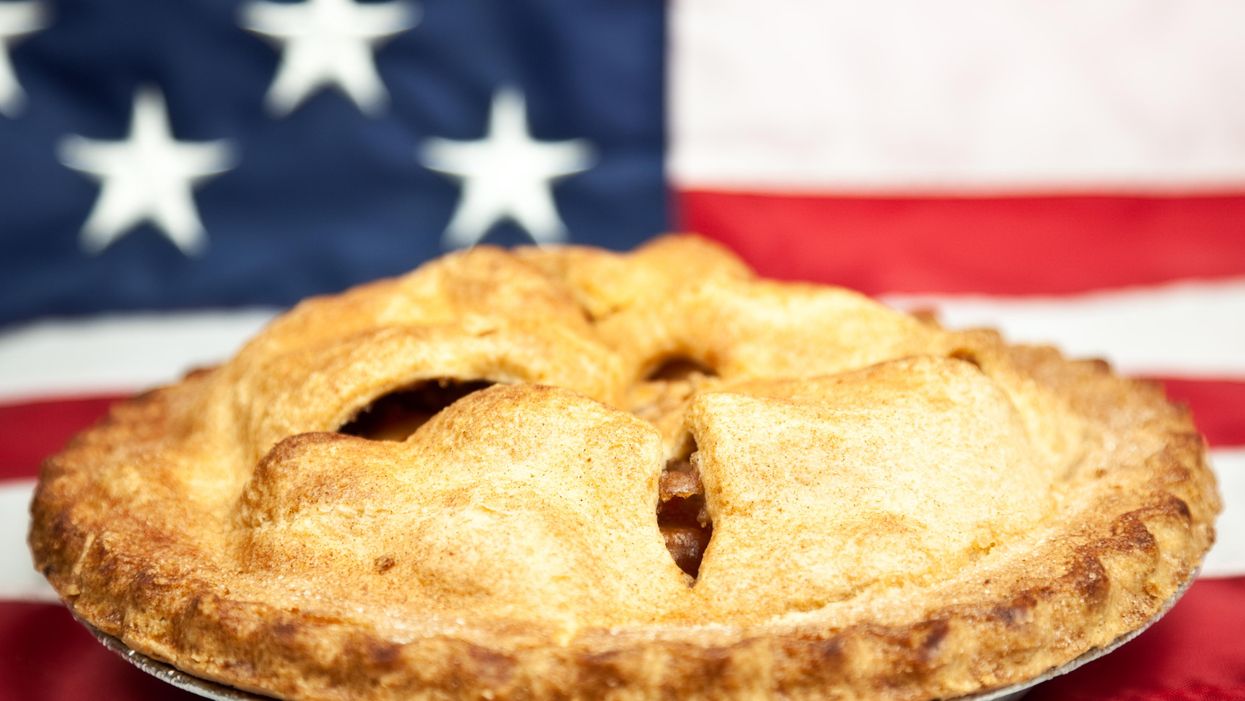Willis is the founder and director of Oregon's Kitchen Table at Portland State University and executive director of the Deliberative Democracy Consortium. She is the author of a textbook, a book of essays and two books of poems. This is the first in a new, regular monthly column called Democracy Pie.
As I launch this column, I might as well tell you the truth. I am a magpie, an enthusiast. I am forever pecking at some shiny piece of tinfoil I found on the sidewalk. Some of those glittering attractions are professional — citizen assemblies and popular education and mutual aid. Some of them are personal — embroidery and color wheels and kayaking. Often, I chase after these gleaming new attractions, learn whatever I can and drop them to pursue the next sparkly thing. But there are a few tarnished bits that I come back to again and again. And, given the title of this column, you will not be surprised that two of them are democracy and pie. A third, as you will see, is poetry.
Even if I think I am pursuing something new, often I discover that seemingly new thing is like a refolded newspaper. I crease and then un-crease it, revealing another section of a deep, old concern. A long-fussed-over worry. As I turn it over and over in my hands, I am reminded of the opening lines of Robert Haas's poem "Meditation at Lagunitas":
All the new thinking is about loss.
In this it resembles all the old thinking.
In my case, a good deal of the new thinking — alongside a whole lot of the old — is about democratic culture and how democracy takes root — or doesn't — in our day-to-day lives. How we live together in our homes and churches and synagogues and mosques and temples and workplaces and classrooms and grocery stores and parks. How we conceive of ourselves in a democratic society and how we might do a bit better at pursuing this elusive enterprise of self-governance. How our inner lives connect with the external expressions that make up our civic and political identities.
Our democracy has suffered a beating the past few years — contested elections, foreign meddling, record levels of institutional mistrust, existential polarization, a violent insurrection at the U.S. Capitol, National Guard troops on the streets of American cities, including Washington, D.C. In a Pew poll released last year, nearly 60 percent of Americans said they are dissatisfied with how democracy is working in this country. A YouGov poll conducted right after Jan. 6 found that 62 percent of Americans thought the events at the Capitol were a threat to democracy.
I swing back and forth between mourning the loss of something vital and knowing — deep in my bones — that American democracy has never lived up to its self-concept. But, as Nikole Hannah-Jones asserted in her introduction to "The 1619 Project," maybe both are true: "The United States is a nation founded on both an ideal and a lie." And ever since that founding, we have been gloriously and cruelly floundering in the space in between.
And yet, according to the 2021 Harvard Youth Poll, more than half of American young people are more hopeful than fearful about the future of the United States, including 72 percent of Black youth and 69 percent of Hispanic youth.
So considering all that, where are we in our pursuit of a more just and humane democracy? This is where I turn to the poets for comfort, or perhaps more accurately, for company. Adam Zagajewski — who was born in Lvov, Poland, in 1945, was displaced from his home both as an infant when Lvov was absorbed into Soviet Ukraine and as a young adult, when he emigrated to Paris and then to the United States. In his poems, Zagejewski frets over the particular losses of leaving and returning, grieving and fleeing the places that define him.
He begins the poem "Submerged City" flatly declaring, "The city will be no more," and then eulogizes what is taken by the sea — summer streets and leafy avenues and church towers. At the midpoint of the poem, though, it turns toward the citizens of the city, surprisingly rescuing himself and all of us: "And still we live on calmly."
Zagajewski continues:
and still, stubbornly, blindly, we seek the image,
the final form of things
between inexplicable fits
of mute despair —
as if vaguely remembering
something that cannot be recalled,
as if that submerged city were traveling with us,
always asking questions,
and always unhappy with our answers —
exacting, and perfect in its way.
I have read this poem dozens of times in recent days, stubbornly, blindly seeking how we might forge a democracy that serves all of us, straining toward how we might unearth a (more) perfect union, some final form of things. But that, as many have discovered before me, is a fool's errand. As Zagejewski not so gently reminds us, that ideal democracy is always out of reach. There is no hidden key that unlocks the door to the holy destination we so desperately seek. Rather, of course, the submerged city —that imagined just and shimmering democracy — lives within our imaginations, ever elusive, and tirelessly exacting in demands that can never quite be met.
I suppose, in the end, that is what I will take on in this column — the questions we ask ourselves between fits of despair and the answers we stumble toward in our stubborn, broken humanness. It will be yearning for something better; it will be messy and imperfect and uncertain; it will be arguably wrong at least some of the time; but I am surely grateful to have you all for company.




















Trump & Hegseth gave Mark Kelly a huge 2028 gift